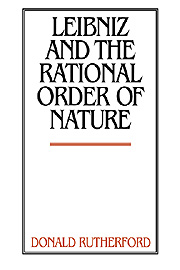6 - Substance
Published online by Cambridge University Press: 05 June 2012
Summary
In common with the tradition of metaphysical thought that descends from Aristotle, Leibniz conceives of the most basic form of existence as substance. Within the created world, substance is the only being that exists per se: the only being whose existence depends on that of no other being except God. By contrast, the existence of all other things depends in an essential way on that of substance. Given the priority thus assigned to substance, it is obvious that any metaphysical theory must devote considerable attention to an account of its nature. Our concern in this chapter will be with the distinctive features of Leibniz's doctrine of substance, which he himself acknowledges as largely determining the content of his metaphysical system.
The Characteristics of Substance
In Book II of his Essay Concerning Human Understanding, Locke writes of the scholastic notion of substance:
[W]ere the Latin words Inhaerentia and Substantia, put into the plain English ones that answer them, and … called Sticking on and Under-propping, they would better discover to us the very great clearness there is in the doctrine of Substance and Accidents, and shew of what use they are in deciding of Questions in Philosophy. (II, xiii, 20)
Responding to this passage in the New Essays, Leibniz declares that he is “of another opinion,” and that “the consideration of substance is one of the most important and most fruitful questions in philosophy” (II, xiii, 20; RB 150).
- Type
- Chapter
- Information
- Leibniz and the Rational Order of Nature , pp. 133 - 174Publisher: Cambridge University PressPrint publication year: 1995



